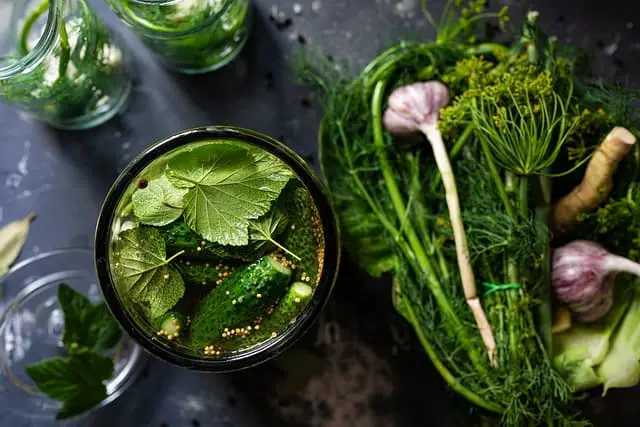You can combine mustard powder and celery seeds in your culinary creations as these two spices can add a flavorful and aromatic twist to your dishes. Mustard powder brings its characteristic pungent and tangy flavor, while celery seeds contribute a warm and slightly bitter taste with hints of celery flavor.
This combination works well in salad dressings, marinades, spice rubs, and pickling blends. It adds depth and complexity to meat, poultry, vegetables, and even homemade condiments.
Dishes That Combine Mustard Powder And Celery Seeds
The combination of mustard powder and celery seeds can enhance the flavor of various dishes. Here are some examples:
- Coleslaw: Add a mixture of mustard powder and celery seeds to the dressing for a tangy and aromatic twist.
- Pickles: Incorporate mustard powder and celery seeds in your pickling brine for a flavorful and zesty pickle.
- Meat rubs: Create a spice rub with mustard powder, celery seeds, and other herbs and spices to season chicken, pork, or beef before grilling or roasting.
- Potato salad: Mix mustard powder and celery seeds into the dressing for a flavorful and savory potato salad.
- Homemade sausages: Combine mustard powder and celery seeds with other spices to make your own flavorful sausage mix.
- Baked beans: Add mustard powder and celery seeds to your baked beans for an extra layer of flavor and complexity.
- Salad dressings: Incorporate mustard powder and celery seeds into vinaigrettes or creamy dressings for a zingy and aromatic kick.
Remember to adjust the quantities of mustard powder and celery seeds to suit your taste preferences and the specific dish you are preparing.
Mustard Powder And Celery Seeds Comparison
Here’s a comparison table highlighting the characteristics of mustard powder and celery seeds:
| Mustard Powder | Celery Seeds | |
|---|---|---|
| Taste | Strong, pungent, slightly bitter | Warm, earthy, slightly bitter |
| Aroma | Sharp, tangy, pungent | Aromatic, herbal, slightly sweet |
| Usage | Used as a spice, condiment, or in marinades, dressings, and sauces | Used as a spice, flavoring agent, or garnish in various dishes |
| Flavor Affinities | Combines well with garlic, vinegar, honey, and other spices like paprika, cumin, and turmeric | Complements dishes with carrots, potatoes, chicken, seafood, and tomato-based sauces |
| Culinary Application | Enhances the flavor of meats, stews, dressings, and marinades | Adds a unique flavor to soups, salads, pickles, bread, and vegetable dishes |
| Texture | Fine powder consistency | Small, oblong seeds |
| Origin | Derived from the mustard plant’s seeds | Derived from the celery plant’s seeds |
| Health Benefits | Contains antioxidants and anti-inflammatory properties | Rich in fiber, vitamins, and minerals like calcium, potassium, and vitamin C |
| Heat Level | Mild to medium spiciness, depending on the variety | No heat, imparting a mild flavor |
Please note that these characteristics can vary slightly based on the specific variety and quality of the mustard powder and celery seeds. It’s always recommended to taste and adjust the quantities based on personal preferences and the specific dish being prepared.

